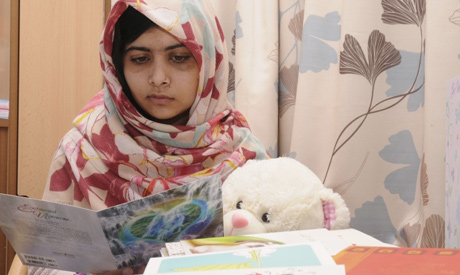
Pakistani schoolgirl Malala Yousufzai reads a card as she recuperates at the The Queen Elizabeth Hospital in Birmingham, in this undated handout photograph released to Reuters on November 8, 2012. (Photo: Reuters)
The families of more than 3 million poor children in Pakistan will receive cash stipends if their children go to school, the government said as officials prepared to mark "Malala Day" on Saturday in support of a schoolgirl shot by the Taliban.
UN officials declared Malala Day one month after 15-year-old Malala Yousufzai and two of her classmates were shot by the Pakistan Taliban. She had been targeted for speaking out against the insurgency.
In the days following the shooting, Yousufzai became an international icon and world leaders pledged to support her campaign for girls' education. She is now recovering in a British hospital.
On Friday, Pakistani president Asif Zardari added his signature to petitions signed by more than a million people urging Pakistan to pay stipends to families who put their girls in school in honour of Malala.
"Malala's dreams represent what is best about Pakistan," said former British Prime Minister Gordon Brown as he presented the petitions to President Zardari.
Tens of thousands of Britons have called on the government to nominate Malala Yousufzai for a Nobel Peace Prize for her work promoting girls' education.
On Friday, the government announced that poor families will now receive $2 a month per child in primary school.
The programme will be funded by the World Bank and Britain and distributed through the government's Benazir Income Support Programme, designed to give small cash payments to needy families. The families in the programme already receive $10 a month for basic expenditure.
After a stipend programme was put in place in Pakistan's Punjab province, a World Bank study found a nine per cent increase in girls' enrolment over two years, said Alaphia Zoyab, the South Asia campaigner for internet activist group Avaaz.
Pakistan is struggling to overcome widespread poverty, a Taliban insurgency and massive, endemic corruption. Less than 0.57 per cent of Pakistan's 180 million citizens pay income tax, money that the government could use to educate poor children.
Instead, the Pakistani government relies on foreign donors to fund many social programmes. Britain is due to spend around $1 billion on helping Pakistan educate poor children by 2015.
Short link: